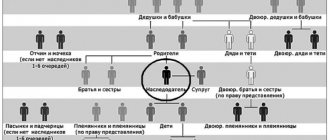General procedure for dissolving a marriage in court
According to the requirements of legal proceedings, to begin divorce proceedings, the plaintiff must submit an application at the defendant’s place of residence.
Reference. If there are no joint children, the case can be resolved by the magistrate's court; if there are common offspring, the claim is filed in the district court.
How is the procedure carried out?
The divorce procedure is carried out in the following order:
- documents are submitted to the office, after which the judge sets a date for the hearing;
- at the hearing, the judge gets acquainted with the parties’ requests and the application itself;
- at the stage of debate, the plaintiff and defendant are given the last word;
- the judge makes a decision and familiarizes both parties with its text;
- the parties have the right to appeal the decision within 30 days from the date of its delivery.
Without presence or without consent - the difference between concepts
Divorce without presence implies a situation where a participant in the process:
- asks to consider the case in his absence;
- does not make any demands, simply does not appear at the court hearing.
In a divorce without consent, one of the parties objects to the plaintiff's demands. In this case, the court is obliged to establish the reasons for the divorce and the possibility of reconciliation.
Attention. If it is not practical to preserve the family, the marriage will be dissolved even against the wishes of the defendant.
Without the participation of husband or wife
Divorce without the presence of one of the spouses is possible only if all formalities are met, as stated in Art. 167 and art. 233 Code of Civil Procedure of the Russian Federation.
Will they get divorced if one of the spouses doesn’t show up?
If the spouses were duly notified of the date and time of the trial, but were unable to attend, the courts have the right to resolve the case on its merits.
In what cases is this acceptable?
Divorce in the absence of a husband or wife is possible in the following cases:
- there is written consent to divorce;
- a request has been made to consider the case in the absence of the plaintiff or defendant;
- Representatives are involved in the case.
How and when can the participation of a representative by proxy be used?
According to Art. 182, art. 185 of the Civil Code of the Russian Federation, the parties have the right to involve their responsible representatives in the case, who will represent their interests. To do this, they just need to issue a power of attorney at any notary office, which will list in detail the powers transferred to them and indicate the validity period of this document.
Attention. Representatives can protect the interests of principals not only in court, but also submit documents for divorce to the registry office.
Will they get divorced if one of the spouses does not come to court?
One of the most common questions our lawyers are asked is: will the court divorce spouses if one of them does not attend court hearings?
Expert opinion
Semyon Frolov
Lawyer. 7 years of experience. Specialization: family, inheritance, housing law.
Question: I decided to divorce my wife, but she categorically does not support my decision. The wife did not come to the first preliminary court hearing. It was decided to postpone the court hearing, but it is unlikely that the wife will agree to come next time. Will my wife and I be divorced if she never shows up for a single court hearing?
Lawyer's answer: Even if the spouses do not agree on the divorce, this does not mean that the court will refuse to satisfy the claim. It is impossible to force a wife to agree to a divorce. But you also cannot be forced to stay married against your will. The claim will be accepted and considered, even if your spouse expresses categorical disagreement, no matter how it is expressed, including failure to attend court hearings.
Divorce in the absence of one of the spouses is possible. But for this the following conditions must be met:
- If the plaintiff or defendant cannot attend the court, he needs to prepare and submit a petition to consider the case in his absence (according to paragraph 5 of Article 167 of the Code of Civil Procedure of the Russian Federation).
- If the plaintiff or defendant filed a petition in which he asked to postpone the court hearing due to valid reasons, the court may postpone the hearing . A final decision is not made, the consideration of the case is postponed, the parties are sent a determination to postpone the court hearing and a summons indicating its date, time and place.
- If a party has not notified the court of the existence of valid reasons for absence, the court has the right to consider the case without the absent party - subject to proper notification.
Let us consider in more detail what are the features of missing court hearings by the plaintiff or defendant.
The plaintiff did not come to court
It is one thing if the defendant “boycotts” the trial, for example, with a categorical reluctance to get a divorce, but it is a completely different matter if the direct initiator of the divorce procedure is not on the appointed day and time.
Missing a court hearing on the part of the plaintiff is the reason for the delay or even termination of the trial. Of course, the absence of the plaintiff at the first court hearing will not entail the court’s refusal to consider the case. What will the court do in this case? If the plaintiff has not previously informed the court of the reason for his absence and has not filed a motion to consider the case without him, the court will most likely reschedule the hearing . The parties will be notified again of the date and time of the next meeting.
At the same time, the court will find out the defendant’s position on the subject of the family dispute. If it turns out that the defendant does not want to get a divorce, another missed court hearing by the plaintiff will result in the termination of the trial and the return of the claim. If the defendant does not object to the divorce, he can prevent the return of the claim and ask the court to make a decision without the presence of the plaintiff.
In most cases, repeated failure of the plaintiff to appear is grounds for returning the claim and terminating the trial . At the same time, the law does not prevent the plaintiff from filing a claim again, or challenging the court’s ruling to return the claim, if the reasons for missing the court hearing were still valid.
The defendant did not come to court
Deliberate boycott of the divorce process on the part of the defendant is a very common occurrence. Many people think that skipping court dates is a way to “buy time” or even avoid a divorce. But that's not true.
What does the court do if the defendant does not show up at the appointed time?
If the defendant notifies the court in advance of the impossibility of attending the court hearing, the course of the case may be as follows:
- consideration of the case and making a decision without the defendant , if he has expressed his consent to the divorce in writing;
- postponement of the court hearing if the reasons for the defendant’s failure to appear are valid, which is confirmed by the necessary documents.
As a rule, the court hearing is postponed even if no notice has been received from the defendant. But such a transfer is possible no more than three times. Subpoenas are sent to the parties again. And if the defendant, duly notified, does not receive a response, the case is considered without him - in absentia. A court decision in absentia can be canceled if, within 7 days, a corresponding application is received from the defendant, accompanied by arguments and evidence that may influence the court decision.
Sometimes the defendant does not come to court only because he does not even know about the divorce process. For example, if he lives at a completely different address from that indicated in the statement of claim. Read “How to find out if a divorce claim has been filed” by the wife or husband.
Both spouses did not show up
If spouses agree to divorce, they can take steps in advance to avoid attending court hearings altogether. The divorce will take place without the presence of the spouses.
What is needed for this?
- from the plaintiff - a petition to consider the case in his absence;
- from the defendant - written and notarized consent to divorce and a petition to consider the case in his absence;
- from the plaintiff and/or defendant - a notarized power of attorney for representation of interests in court by an authorized person (with a list of powers).
What happens if the plaintiff does not come?
If the plaintiff does not want or cannot be present at the trial, he has the right to petition the judge and ask to consider the case without him.
Actions of the judge
In such cases, the judge must comply with the following regulations:
- identify the persons who appeared at the meeting;
- consider received appeals and decide to consider the case in the absence of one of the parties;
- announce the plaintiff’s demands and hear the defendant;
- make a decision on the case.
What is the decision?
In case of failure to appear, the plaintiff cannot defend his position; if the defendant objects, then the court has the right to suspend the hearings and give time for reconciliation. In addition, if the applicant has not asked the court to consider the case without him, the claim may be rejected. If all formalities are met, the court will dissolve the marriage.
Divorce in the absence of the plaintiff
Below we will tell you what to do if the plaintiff does not appear at the divorce trial.
Actions of the judge
The applicant's failure to appear at the hearing does not always result in termination of the divorce proceedings. The judge's actions depend on the specific circumstances. What will happen to the case if the plaintiff does not come to court for divorce:
The hearing will take place
The meeting will be held according to the general rules of civil procedure. But for this, the plaintiff must file a petition to consider the case in his absence. The defendant's position is clarified.
The meeting will be postponed
This outcome is possible if the plaintiff fails to communicate the reason for his absence. Summons must be sent to the parties indicating the date of the next hearing.
The process will be terminated and the claim will be returned.
This result is preceded by repeated failure to appear at the meeting without good reason.
The result of non-appearance for the parties
For the plaintiff:
- if the hearing is adjourned, you will be required to appear at the next hearing;
- If the case is terminated, the right to file a similar application again is retained.
For the defendant:
- when he insists on divorce, the judge has the right to make a decision in the absence of the plaintiff.
If the defendant does not arrive
Important. The absence of the defendant at the hearing is not an obstacle for the court.
If a party is interested in a quick resolution of the case on the merits, he can submit written consent to the divorce and a request not to delay the hearing.
Actions of the servant of Themis
The judge is obliged:
- establish the reasons for the defendant’s failure to appear, consider the requests received from him, postpone the hearing if there are good reasons;
- resolve the case on its merits in the absence of the defendant more than 3 times without a good reason, or with his consent to the divorce;
- make a decision and send it to the parties within the time limits established by law.
Bottom line
If the divorce is agreed to and there is written confirmation, the court will grant the plaintiff’s request and make a decision in his favor. If the defendant deliberately delays the case and does not appear in court more than 3 times, the decision is made in absentia .
How to speed up the divorce process if the defendant fails to appear?
If the defendant intentionally fails to appear in court, the plaintiff may take steps to expedite the divorce.
Causes and solutions
The most common reasons why a defendant may delay the process are:
- Request for time for reconciliation. The plaintiff must prepare a motion to dismiss and provide good cause.
- Business trips. The judge has the right to consider the case in the absence of the other party, since he was duly notified.
- Inadequate notice of the place and time of hearings. The plaintiff should provide the office with all possible addresses.
Request for consideration of the case
You can speed up the proceedings by:
- Petitions to consider the case in the absence of the defendant. It is submitted to the court office or during the trial. The document states:
- details of the plaintiff and defendant;
- brief information about the case (number and date);
- a requirement to speed up hearings or not to delay the process due to the absence of the defendant for an unexcused reason.
- Written consent to divorce. The document is certified by the signature of the defendant, and the text indicates the wording “I support the plaintiff’s request for divorce.”
Absentee decision
The court has the right to consider the case and make a decision in absentia if:
- the defendant was duly notified and there were no requests for adjournment;
- The plaintiff does not object to the consideration of the case.
Attention! When making a decision in absentia, the court is obliged to send a copy of the act to the defendant no later than 3 days after the end of the hearing.
An automatic divorce is possible in cases where the judge has information that:
- the defendant knew about the claim and could familiarize himself with its contents;
- was notified of the hearing date but did not appear.
Is the defendant required to appear in court?
The trial takes place with mandatory notification of the parties - the plaintiff and the defendant. The duty of the judge is to notify the participants in the process of its beginning by sending a summons. On the appointed day, the plaintiff and defendant must appear in court.
There are cases when the defendant cannot, for some reason, appear in court on the appointed day.
Options for action in this situation:
- The defendant must notify the court in writing of the impossibility of appearing at the hearing and ask to consider the case in his absence, indicating his relationship to the claim. In this case, the judge will consider the case regardless of his appearance.
- The defendant may ask to reschedule the case, but in this case he must present evidence confirming the valid reason for the absence (Article 167 of the Code of Civil Procedure of the Russian Federation). In such a situation, the court hearing is postponed.
Expert opinion
Stanislav Evseev
Lawyer. Experience 12 years. Specialization: civil, family, inheritance law.
If the spouse has filed a petition in which he asks to suspend the process due to valid reasons for his failure to appear, the court may postpone the consideration of the case to another date. This means that the judge does not render a verdict, the hearing is adjourned, and the parties are sent a copy of the adjournment order and repeated subpoenas.
If the defendant does not consider it necessary to notify the court, the case may be considered without him, and failure to appear in court will be regarded as a waiver of his right to defense.
If both sides are missing
The legislation does not prohibit the consideration of this category of cases in the absence of both parties.
Causes
The reasons for the absence of parties at the trial can be either respectful or disrespectful. The court will listen to the absent spouse if he can confirm the failure to appear due to the fact that:
- is in hospital treatment;
- has a disability that limits mobility;
- lives in another city or is abroad.
Unexcused reasons include:
- illness, if there is no sick leave;
- lack of time for court hearings;
- failure to receive a letter notifying the place and time of the hearing.
What should the parties do?
The procedure in this case is exactly the same as in all others. The plaintiff needs:
- submit an application to the court office and pay the state fee;
- attach to the application a request for consideration of the case in his absence;
- if his interests will be protected by a representative, it is necessary to issue a power of attorney.
Attention! The plaintiff has the right to include a requirement to consider the case in his absence directly in the statement of claim.
If the defendant is also unable to attend the hearing, the trial may be postponed. To prevent this from happening, you must:
- no less than a day before the hearing, send to the office a request to consider the case in the absence of the defendant;
- prepare consent for divorce.
How will the divorce process proceed?
The process goes through several stages:
- the judge finds out who is present in the courtroom and the parties’ motions;
- claims and counter-objections are announced;
- the debate stage in such a process is formal in nature due to the absence of the plaintiff and defendant;
- the judge then makes a decision.
Divorce in the absence of a defendant
Next we will look at how a divorce proceeds if the defendant fails to appear.
Actions of the judge
How can the court act if the defendant fails to appear at the hearing if there is evidence of proper notification of the date of the hearing:
- postponement of the trial (if the reasons for not attending the trial are valid and confirmed), sending new subpoenas;
- consideration of the case in the absence of the other party, if consent to divorce has been received from her.
The result of non-appearance for the parties
If the defendant did not send any statements, then if he fails to appear again, the case will be considered without him in absentia.
If the other party is absent from court for an unexcused reason, the hearing will take place and the claim will be satisfied.
The nuances of dissolving a marriage in the registry office if the husband or wife fails to appear
According to Art. 19 of the RF IC, spouses can dissolve their marriage not only in court, but also by submitting an application to the registry office. The application is considered within a month from the date of submission, after which the divorced person is issued a certificate.
Procedure
- Divorcing persons must fill out Form No. 9 and submit it along with a package of documents to the registry office at the place of residence of one of the spouses. Documents can be sent by mail or through the State Services portal.
- After checking the correctness of filling out the application, the registry office staff informs the parties on the day the divorce procedure is completed.
- On the specified date, one of the parties must be present to receive the certificate and make a note in the passport.
Required documents
The following must be attached to the application in Form No. 9:
- original marriage certificate;
- original payment receipt for payment of the fee;
- copies of passports of both spouses.
If one of the spouses is missing, convicted or incapacitated
According to paragraph 2 of Art. 19 of the RF IC, a divorce can be filed at the request of one of the parties in cases where the second spouse:
- declared missing by the court, for which there is a decision that has entered into legal force;
- incompetent, which is also confirmed by a judicial act;
- sentenced to more than 3 years and is serving his sentence in prison.
In this case, the original of the decision that has entered into legal force and an application in Form No. 11 must be attached to the package of documents.
The divorce procedure is considered simple if both parties do not object to such a decision. However, if the defendant deliberately prevents the timely consideration of the case, the court may take several months, but in the end the decision will still be made in favor of the plaintiff.
If one of the spouses does not appear for the divorce at the registry office
Administrative divorce (through the registry office) is a much simpler and faster procedure than the judicial divorce process, but for its implementation it is necessary to comply with a number of conditions.
- Consent of husband and wife to divorce.
- Childlessness of a married couple;
- There are no disputes between husband and wife (for example, about dividing housing, about collecting payments for a disabled spouse) that require litigation.
The first condition - the consent of the spouses to divorce - must be expressed in the simultaneous visit of the husband and wife to the registry office and the submission of a joint application for divorce.
True, there is an exception for those spouses who, for various reasons, cannot submit an application together. In this case, only one of them is sent to the registry office, but not as a joint application, but with two separate applications. The signature on the application of the absent spouse must be notarized.
Thus, the presence of the husband and wife when filing an application for divorce at the registry office is mandatory . But the marriage is not dissolved immediately, but 30 days after filing the application, and during the divorce procedure, the presence of at least one of the spouses is sufficient. The failure of both divorcing spouses to appear is grounds for annulment of the divorce application. If, for good reasons, the spouses’ appearance at the registry office at the appointed time is impossible, you need to warn about this and ask to postpone the registration procedure.
Unilateral divorce in the registry office, when the presence of the second spouse is impossible or not necessary - this is an exception provided for in paragraph 2 of Art. 19 RF IC. This course of action is possible if the second spouse...
- Sentenced to imprisonment for a term of 3 years;
- Declared dead or missing in court;
- Incompetent, as determined by a court decision.
For a divorce in one of the listed cases, neither the presence nor consent of the spouse during the divorce procedure at the registry office is required.
Conclusion and conclusions:
- Divorce in court can occur without the participation of one or both spouses.
- If the defendant fails to appear at the hearing, the judge will reschedule the case for another date.
- The failure of the plaintiff to appear also leads to the adjournment of the hearing. Repeated failure to attend court is grounds for returning the divorce petition.
- There are no sanctions for failure to appear in the law.
- It is permissible to dissolve a marriage without the presence of the spouse if the latter files a petition to consider the case in his absence.
- Failure of the defendant to appear more than three times without good reason leads to a default judgment of divorce.
Often, the defendant deliberately skips court hearings, thinking that he will gain time. But we must remember that such failures to appear are fraught with the issuance of a default judgment - regardless of whether the defendant wants it or not? Often the spouse avoids receiving notifications about the date and time of the meeting. The second spouse must be aware of the procedure. Very often difficulties arise with this - plaintiffs simply wait until the defendant deigns to appear in court. This does not happen, the plaintiffs give up... If you have such a case and you don’t know what to do, contact our lawyers. They will suggest the procedure, help with applications and adjust the deadlines. Legal advice increases your chances of success in court. Even if the defendant has his own plans and avoids divorce.
Watch the video, what are the consequences of the defendant’s failure to appear at the court hearing: default judgment, cancellation, valid reasons
Attention!
- Due to frequent changes in legislation, information sometimes becomes outdated faster than we can update it on the website.
- All cases are very individual and depend on many factors. Basic information does not guarantee a solution to your specific problems.
That's why FREE expert consultants work for you around the clock!
- via the form (below), or via online chat
- Call the hotline:
- Moscow and the Region
- St. Petersburg and region
- FREE for a lawyer!
By submitting data you agree to the Consent to PD Processing, PD Processing Policy and User Agreement.
Anonymously
Information about you will not be disclosed
Fast
Fill out the form and a lawyer will contact you within 5 minutes
Tell your friends
Rate ( 1 ratings, average: 5.00 out of 5)
Author of the article
Irina Garmash
Family law consultant.
Author's rating
Articles written
612











